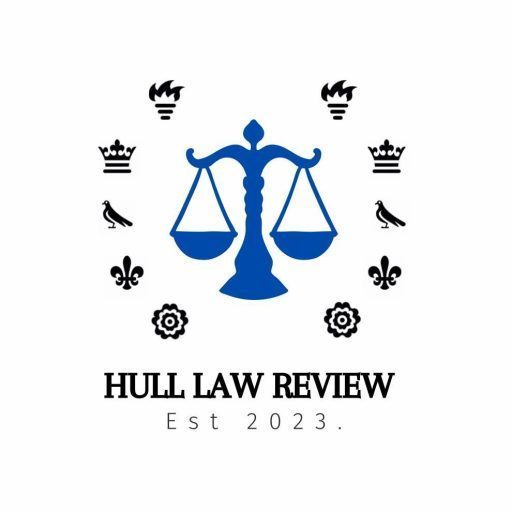
Introduction
The Hull Law Review, established in 2023, serves as the student-led publication unit of the University of Hull Law School. The Review is committed to publishing exceptional legal scholarship that advances legal discourse and knowledge. These guidelines outline the requirements and processes for paper submission and publication.
The HLR publishes original research across all areas of law and legal studies. We welcome papers that demonstrate innovative thinking, rigorous analysis, and significant contributions to legal scholarship. This includes doctrinal legal research, comparative legal analysis, law and society studies, legal theory and jurisprudence, international and transnational law, and contemporary legal issues.
Length and Format of the Submission
Articles must have a minimum of not less than 3,500 and shall not exceed 7,500 words, excluding citations, footnotes, abstracts and bibliography. All submissions must be in Microsoft Word (.docx) format, using Times New Roman font. The main text should be in 12-point font with 1.5 line spacing, while footnotes should be in 10-point font with single spacing. Margins must be set at 2.54 cm (1 inch) on all sides.
Length and Format Requirements for Special Submissions
Commentaries on current legal developments should be 3,000-4,000 words, including a brief abstract and clear statement of significance.
Case comments analysing judicial decisions should be 2,000-3,000 words, focusing on the reasoning and implications of the judgment.
Book reviews offering critical evaluation of recent legal publications should be 1,500-2,000 words.
All submissions must use Times New Roman 12-point font, 1.5 line spacing, and OSCOLA citations. Include a title page with the author’s name and contact information.
Title Page and Structure
Each article must begin with a title page containing the following information: the full title of the article, author’s name, contact email, an abstract of 200-250 words, and four to six keywords. The abstract should clearly state the article’s objective, methodology, main findings, and conclusions.
Language and Writing Style
All articles must be written in British English, demonstrating clear, precise, and academically rigorous writing. Authors must ensure proper grammar, punctuation, and spelling throughout their work. The writing should be accessible to an informed legal audience while maintaining scholarly depth and sophistication.
Citation and Referencing
The Review adheres to the Fourth Edition of the OSCOLA (Oxford University Standard for Citation of Legal Authorities) referencing style. The full volume of the Fourth Edition is available here. A Quick Reference Guide of OSCOLA is available here. All citations must be provided as footnotes, not endnotes. Authors must include a comprehensive bibliography at the end of the paper, listing all cited sources in alphabetical order.
Review Process
Stage One: Initial Review and Desk Decision
The initial review process begins with a comprehensive assessment by the Editorial Board. This stage evaluates submissions based on the following criteria:
First, the paper is checked for compliance with all formatting and submission requirements as outlined in these guidelines. This includes verification of word count, proper formatting, and complete documentation.
Second, the Editorial Board evaluates the overall writing quality, including clarity of expression, logical flow of arguments, and proper use of legal terminology. The board pays particular attention to grammar, syntax, and structural coherence.
Third, the submission is examined for proper citation and referencing according to the OSCOLA standard. This includes checking the accuracy and completeness of citations and the proper formatting of footnotes. During this stage, the Editorial Board may contact authors for clarification or minor revisions if needed.
The Board will reach one of these three decisions:
1. Paper satisfies the style guide, referencing requirements and merits peer review – the Editorial Board proceeds to the peer review process;
2. Paper merits consideration, but needs some refinements in arguments, contents, style, structure or referencing – sent back to the author with initial comments and scope for resubmission;
3. Paper seems not suitable for further consideration – reject the submission.
Stage Two: Peer Review Process
Articles that pass the initial review enter the peer review stage, which implements a rigorous double-blind review process conducted by subject matter experts. This stage applies high academic level scrutiny to ensure the highest academic standards and integrity of publication. The peer review process examines five key areas: methodological rigour, theoretical foundation, depth of analysis, research contribution, and the strength of arguments and conclusions. Reviewers assess whether the research makes a meaningful contribution to legal scholarship and whether the methodology and analysis meet the highest academic standards.
Peer reviewers provide detailed feedback and recommendations, leading to one of four outcomes: accept without revisions, accept with minor revisions, accept with major revisions, or reject. Authors receiving revision requests must be willing to address all review comments comprehensively in their revised submission. Before the final acceptance, the editorial board must be satisfied that those comments have been complied with.
Publication Ethics and Copyright
Authors must certify that their submission represents original, unpublished work (except papers that have passed academic assessment at the university) and is not under consideration elsewhere. Any potential conflicts of interest must be declared at the time of submission. The Review maintains a strict policy against plagiarism and self-plagiarism, and all submissions undergo thorough originality checking.
While authors retain copyright of their work, the Hull Law Review receives an exclusive license to publish the accepted article. Authors are responsible for securing permission to reproduce any copyrighted material included in their submission.
Submission Process and Timeline
To submit an article, authors should send their work to the Managing Editor through t.m.webster-2021@hull.ac.uk. The submission package must include the complete article and a signed author declaration form.
The Editorial Board aims to complete the initial review within 2-3 weeks of submission. The peer review process typically requires 8-12 weeks. Accepted articles are published in the next available issue of the Review.
Contact Information
For any queries regarding these guidelines or the submission process, please contact:
Editorial Board
Hull Law Review
t.m.webster-2021@hull.ac.uk.
These guidelines are subject to periodic review and update. Authors should ensure they are referring to the most recent version available on our website.

